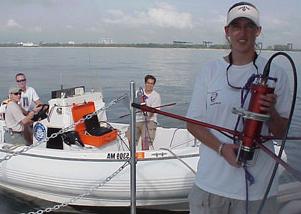Center for Acoustics and Vibrations

Director: Stewart Glegg, Ph.D.
Email: sglegg@luckystargb.com
Affiliated Faculty:
Pierre-Philippe Beaujean, Ph.D., Email: pbeaujea@luckystargb.com
Isaac Elishakoff, Ph.D., Email: elishako@luckystargb.com
Nurgun Erdol, Ph.D., Email: erdol@luckystargb.com
George Frisk, Ph.D., Email: gfrisk@luckystargb.com
Gopal Gaonkar, Ph.D., Email: gaonkar@luckystargb.com
Hanqi Zhuang, Ph.D., Email: zhuang@luckystargb.com
- Underwater Acoustics
- Sonar Technology
- Structural Acoustics and Vibration
- Aeroacoustics and Hydroacoustics
- National Science Foundation
- Office of Naval Research
- The Naval Surface Warfare Center
- Naval Underwater Systems Center
- Naval Research Laboratory and
- NASA.
The Center supports a number of graduate students and graduate degrees are offered at the Masters and Ph.D. level in ocean or mechanical engineering with specialization in acoustics and vibrations.
Research Areas Overview
Aero- and Hydro- Acoustics
The CAV has an ongoing program on aero- and hydro- acoustics that has attracted sponsored research from NASA, ONR, FDOT, FFWC and industry for over 25 years. Most of the work has been in collaboration with other universities including Virginia Tech, Southampton University, UK, University of Notre Dame, Cambridge University, UK and recently Lehigh University. Projects include work on the design of aircraft engines for reduced noise, and fundamental studies on sound generation by flow.
|
|
| Photo courtesy of Justin Jaworski, Lehigh University and Ian Clark, Virginia Tech. |

Silent Flight of Owls
Investigative reseach has identified owl's feathers as being covered in a textured surface that has similarities to a field of wheat or a forest canopy. Theoretical work at FAU suggests that the textured surface of the feather can cause a 30 decibel reduction in surface pressure fluctuations at high frequencies and this may be linked to the exceptionally quiet flight of the owl. The reduced surface pressure has been verified by wind tunnel measurements made at Virginia Tech in the Center for Renewable Energy and Aerodynamic Testing (CREATe).
Collaboration with: Lehigh University, Cambridge University and Virginia Tech.
Sponsored by: the Office of Naval Research.
|
|
| Three undergraduate students and a graduate student testing an FAU Dual Purpose Acoustic Modem off the coast of Fort Lauderdale, Florida. |
The CAV has major programs in underwater acoustics with projects in the following areas:
- sonar and signal processing
- acoustic inversion
- acoustic communications
- structural vibrations applied in particular to subsea machine fatigue.
Hermes
Hermes is a high-frequency underwater acoustic modem capable of very high bit rates in challenging acoustic environments. This technology is now licensed to an industrial partner, Edgetech.
Collaboration with: MIT, University of Michigan, SPAWAR, BlueFin Robotics, Woods Hole Oceanograhic Institution of Oceanography, NSWC, Edgetech and HBOI.
Sponsored by: ONR, NSWC, Office of Explosive Ordinance Disposal, NSF, SERDC, the NATO Undersea Research Centre, Edgetech and SNMREC.
Rapidly Deployable, Recoverable, and Reusable (RDRR) Gateway Buoys
Freely drifting buoys equipped with hydrophones, GPS navigation, and radio telemetry are used to measure the acoustic characteristics of complex shallow-water environments. The data can be used for the determination of the acoustic properties of the seabed, which the Navy requires for reliable predictions of sound fields in shallow-water operations. The ultimate goal is to transition the experimental methodology and inversion techniques to the operational Navy using commercial-off-the-shelf sonobuoy receivers.
Collaboration with: Woods Hole Oceanographic Institution and the Applied Research Laboratory/Penn State University.
Sponsored by: U.S. Navy

Ship Airwake-downwash Helicopter Interaction
Airwake-downwash turbulence severely affects flight operations for a helicopter taking off or landing on a ship. Relatively little is known about the stochastic features of this interaction. The airwake-downwash turbulence is treated as nonlinearly transformed atmospheric boundary layer turbulence and it is combined with calculations from a CFD-based database of flow velocity measurements for a DDG-81 class ship.
Collaboration with: Naval Air Warfare Center Aircraft Division (NAWCAD), Patuxent River, Maryland.
Stochastic Processes
The CAV performs research in stochastic processes, vibration, buckling and nanotechnology under the direction of Isaac Elishakoff, Ph.D., Distinguished Research Professor in the Department of Ocean and Mechanical Engineering.
Signal Processing of Dolphin and Whale Vocalizations
A set of algorithms has been developed for the analysis and classification of the vocalizations of bottlenose dolphins and right whale Atlantic whale's vocalizations. The algorithms introduce novelty into bioacoustics, a field in which automation of the study of animal calls has only recently been undertaken. In this research methods to classify dolphin whistles according to their types is researched. Successful classification may be used to understand the encoded messages. Image processing techniques on time-frequency spectrograms of vocalizations to generate feature vectors which are then input to classifiers are used. The efficacy of Temporal-Frequency parameters Fourier descriptors (FDs), Local Binary Patterns (LBP) and Gabor wavelets to supply feature vectors to the K-Nearest Neighbor (KNN), Support Vector Machine and Sparse Representation Classifiers is studied.
2018 AIAA Aviation Conference, in Atlanta - AIAA Aeroacoustics Awards Banquet

Dr. Stewart Glegg at the AIAA Aeroacoustics Award Banquet during the AIAA Aviation Conference, in Atlanta, June 2018. Dr. Glegg introduced the awards ceremony for the European CEAS Aeroacoustics award and the AIAA Aeroacoustics Award.

Dr. Stewart Glegg presents the 2018 AIAA Aeroacoustics medal to Professor Tim Colonius of CalTech.

Previous award winners congratulate the 2018 winner, from the left, (with dates of the award): Dr. Chris Tam, FSU (1987), Dr. Dennis Mclaughlin, Penn State (2010), Dr. Stewart Glegg, FAU (2004), Dr. Dimitri Papamoschu, UC-Irvine (2017), Dr. Tim Colonius, CalTech, (2018), Dr. Walter Eversman, U. Missouri-Rolla (2008), Dr. Sanjiva Lele, Stanford University, (2016), Dr. Phil Morris, Penn State, (1999), Dr. Krish Ahuja, Georgia Tech, (1993).

